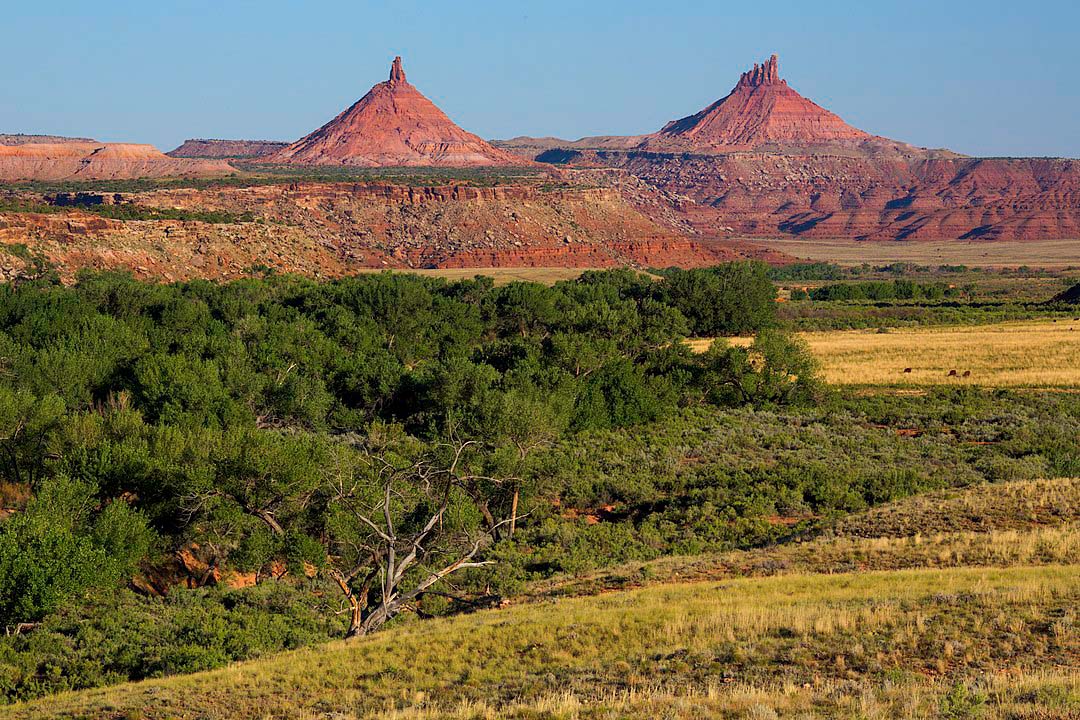
- Details
- By Elyse Wild
The public comment period for the cooperative management plan for Bears Ears National Monument ended on June 11 and is currently under review, the Bears Ears Commission announced yesterday.
The plan is the first-ever tribally informed cooperative management plan for a national monument.
The Commission — made up of five sovereign Tribes — along with the United States Forest Service (USFS) and the Bureau of Land Management (BLM), are now reviewing the public comments into the final management plan for the National Monument.
There are 133 National Monuments in the United States, each afforded permanent protection by Congress or the President. Many protect sites of historic or cultural significance to Native American tribes.
Located in southeastern Utah and just north of the Navajo Nation, the Bears Ears National Monument was declared in 2016 by then-President Barack Obama. It encompasses 2,112 square miles surrounding two buttes resembling bear ears rising from the desert floor. President Trump reduced the monument area by 85% in 2017. It was eventually restored by President Biden in 2021. According to the Commission, the Monument holds more than 100,000 sacred Native American archeological and cultural sites.
Approximately 20,000 individuals participated in the public comment period, providing feedback on the draft Resource Management Plan. Tribal experts, including elected and cultural leaders, participated in 18 full-day and multi-day planning meetings between July 2022 and March 2024 to inform the creation of the draft.
The public comments overwhelmingly supported the use of traditional Indigenous knowledge in managing the Monument.
“I am deeply moved by the overwhelming support I saw for Tribal stewardship in managing Bears Ears,” Malcolm Lehi, White Mesa Council Representative and Bears Ears Commissioner for the Ute Mountain Ute Tribe, said in a statement.
This marks the first time in U.S. history that a commission of Tribal Nations—the Hopi Tribe, Navajo Nation, Ute Mountain Ute Tribe, Zuni Tribe, and Ute Indian Tribe—has worked with federal agencies to create a management plan for their off-reservation ancestral homelands within a 1.36-million-acre national monument.
“For the Ute Mountain Ute Tribe, Bears Ears holds profound cultural and spiritual significance,” Lehi said in a statement. “Our ancestors have cared for this land for centuries, and our traditions are deeply intertwined with its landscapes. Our Tribes lent centuries of invaluable knowledge to this resource plan to ensure that this landscape is here for generations to enjoy long after we are all gone.”
More Stories Like This
Gwich'in Tribal Governments Submit Comments Challenging Fish and Wildlife Service's Inadequate Environmental Review of Arctic Refuge Snow RoadRappahannock Tribe Challenges 9M-Gallon Water Plan
Feds release draft long-term plans for Colorado River management
Apache Leader Walks 60 Miles to Court Hearing That Will Decide Fate of Sacred Oak Flat
Rappahannock Tribe Raises Sovereignty and Environmental Concerns Over Caroline County Water Permit
Help us defend tribal sovereignty.
At Native News Online, our mission is rooted in telling the stories that strengthen sovereignty and uplift Indigenous voices — not just at year’s end, but every single day.
Because of your generosity last year, we were able to keep our reporters on the ground in tribal communities, at national gatherings and in the halls of Congress — covering the issues that matter most to Indian Country: sovereignty, culture, education, health and economic opportunity.
That support sustained us through a tough year in 2025. Now, as we look to the year ahead, we need your help right now to ensure warrior journalism remains strong — reporting that defends tribal sovereignty, amplifies Native truth, and holds power accountable.
 The stakes couldn't be higher. Your support keeps Native voices heard, Native stories told and Native sovereignty defended.
The stakes couldn't be higher. Your support keeps Native voices heard, Native stories told and Native sovereignty defended.
Stand with Warrior Journalism today.
Levi Rickert (Potawatomi), Editor & Publisher


